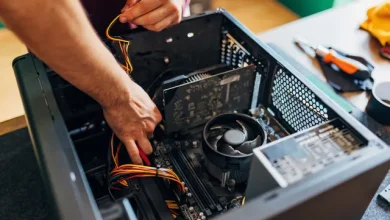The Influence of Technology on Music

Introduction
- Definition of the Intersection Between Technology and Music The intersection of technology and music refers to the dynamic relationship between the tools, devices, and digital platforms that shape the creation, production, distribution, and consumption of music.
- Historical Context: From Analog to Digital Revolution The evolution of music technology has witnessed a journey from analog devices like the phonograph to the digital revolution, fundamentally transforming how music is created and experienced.
II. The Evolution of Music Recording
- The Impact of the Phonograph and Gramophone The invention of the phonograph and gramophone marked significant milestones in music recording, allowing for the preservation and reproduction of sound.
- Analog Tape Recording and Its Influence on Music Production Analog tape recording introduced new possibilities in music production, shaping the sound of iconic recordings and influencing artistic choices in the studio.
III. The Digital Revolution in Music
- The Advent of Digital Audio Recording The shift to digital audio recording brought about unparalleled flexibility, precision, and ease in manipulating sound, revolutionizing the music production process.
- The Rise of MIDI and Electronic Music Production The introduction of MIDI (Musical Instrument Digital Interface) empowered musicians to create electronic music, paving the way for genres like electronic dance music (EDM) and synth-pop.
IV. Sampling and Remix Culture
- The Influence of Sampling on Music Creation Sampling allowed artists to incorporate existing sounds into new compositions, giving rise to innovative genres and reshaping the creative landscape.
- The Emergence of Remix Culture and Its Impact on Genres Remix culture, fueled by technology, has democratized music creation, enabling a participatory culture where fans become creators, influencing the evolution of various music genres.
V. Effects of the Internet on Music Distribution
- The Shift from Physical to Digital Distribution The internet revolutionized music distribution, moving from physical formats like CDs to digital downloads, fundamentally altering how music reaches audiences.
- The Role of Streaming Platforms in the Modern Music Landscape Streaming platforms have become dominant in music consumption, offering on-demand access to vast catalogs and shaping new revenue models for artists.
VI. Home Studios and DIY Music Production
- Accessibility of Music Production Tools Advancements in technology have made professional-grade music production tools accessible to independent artists, fostering a DIY (do-it-yourself) ethos.
- The Democratization of Music Creation Through Home Studios Home studios empower artists to create and produce music independently, reducing the traditional barriers to entry into the music industry.
VII. Innovations in Instrumentation
- Electronic Instruments and Synthesizers The development of electronic instruments and synthesizers expanded the sonic palette, contributing to the diversification of musical genres.
- Virtual Instruments and the Expansion of Sonic Possibilities Virtual instruments and software allow musicians to explore a vast array of sounds, pushing the boundaries of sonic experimentation.
VIII. Live Performance and Technology
- Technological Advancements in Concert Production Live performances have evolved with technological innovations, including advanced sound systems, lighting effects, and interactive visual displays.
- The Integration of Technology in Live Performances Artists incorporate technology into live shows, utilizing electronic instruments, digital effects, and multimedia elements for immersive and memorable performances.
IX. The Influence of Social Media on Music
- Connecting Artists With Global Audiences Social media platforms provide a direct and immediate connection between artists and fans, facilitating global reach and real-time engagement.
- The Role of Social Media in Shaping Musical Trends Social media influences music trends, with platforms like TikTok having a significant impact on the popularity and virality of songs.
X. AI and Machine Learning in Music
- AI-Generated Music and Composition Advancements in AI enable the generation of music, from composition to production, opening new possibilities for collaboration between humans and machines.
- The Use of Machine Learning in Music Recommendation Algorithms Machine learning algorithms analyze user preferences to deliver personalized music recommendations, shaping how listeners discover and engage with new music.
XI. Challenges and Controversies in Musical Technology
- Copyright and Digital Piracy Issues The digital era has brought challenges related to copyright infringement and digital piracy, necessitating new approaches to protect intellectual property.
- The Debate on the Authenticity of Digitally Produced Music As technology enables unprecedented manipulation of sound, debates arise regarding the authenticity and artistic merit of digitally produced music.
XII. The Future of Music Technology
- Augmented Reality and Immersive Music Experiences The integration of augmented reality promises immersive music experiences, blurring the lines between the physical and virtual realms.
- Predictions for the Continued Evolution of Music Technology The future holds exciting possibilities, with continued innovations in music technology likely to reshape how we create, experience, and interact with music.
Conclusion
The influence of technology on music is an ongoing narrative of innovation, creativity, and democratization. As technology continues to evolve, it not only transforms how music is made and consumed but also shapes the very fabric of musical expression and cultural connectivity.
FAQs
- How has technology changed the way music is recorded? Technology has transitioned from analog recording (phonograph) to digital audio recording, revolutionizing the precision and flexibility of music production.
- What role does the internet play in music distribution? The internet has shifted music distribution from physical formats to digital platforms, with streaming services dominating the modern music landscape.
- How has social media impacted the music industry? Social media connects artists directly with global audiences, influencing trends and providing a platform for the viral spread of music.
- What is the role of AI in music creation? AI contributes to music creation through the generation of compositions and the development of machine learning algorithms for personalized music recommendations.
- What challenges does the music industry face in the digital era? Challenges include issues related to copyright, digital piracy, and debates on the authenticity of digitally produced music.









